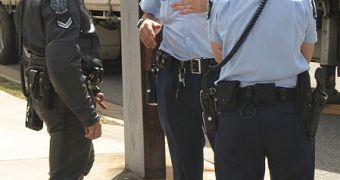According to a new scientific study, policemen who are more able than their colleagues to keep a hold of their temper while in life-threatening situations are also less likely to shoot people who are not actually carrying guns. While this may seem like the logical thing to do, there are many instances in which individuals have been gunned down while reaching for their ID cards, or for carrying a bottle of water, which some law enforcement officers have mistaken for a gun.
The scientific study that has come to this conclusion has been conducted by researchers at the Georgia State University, who asked several police officer to play a video game simulation, in which they had to assess situations in a very short amount of time. GSU assistant professors of psychology Heather Kleider, Dominic Parrott and Tricia King conducted the new research, which focused on the officers' ability to multi-task, as in to perform several mental processes at once.
The experts analyzed signs of negative emotions, as well as the capacity of each participant's working memory. Their ability to reason under pressure was also looked upon. While other scientific studies focused on the effects environmental factors such as ethnicity, stereotypes, and neighborhood crime rate had on police officers, this one has concentrated merely on their own characteristics and their influences on the shooting decision.
“In cognitive psychology, operation span, or working memory, is an overarching cognitive mechanism that indicates the ability to multi-task, and the amount of available capacity to perform tasks varies by individual and situation. People with a higher capacity are able to keep more things 'in play' at one time,” Kleider said.
“An important thing to consider is that some decision making requires controlled processing wherein balanced/accurate decisions require impulse control. For some people, this usurps a substantial amount of available working memory capacity to control impulses, and if you are someone with a lower capacity, it's harder to do,” the expert concluded.
Details of their study, Shooting Behavior: How Working Memory and Negative Emotionality Influence Police Officer Shoot Decisions, will appear in the 2009 edition of the scientific journal Applied Cognitive Psychology.

 14 DAY TRIAL //
14 DAY TRIAL //